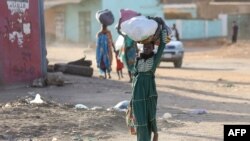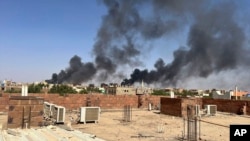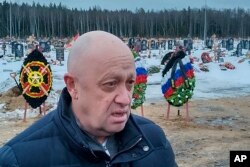On April 15, fighting erupted between Sudan’s de facto military ruler, Abdel Fattah al-Burhan, and the leader of paramilitary Rapid Support Forces (RSF), Mohamed Hamdan “Hemedti” Dagalo.
The two were once allies who colluded in a 2021 military coup that toppled the transitional civilian government formed after strongman ruler Omar al-Bashir was deposed in 2019.
A framework agreement to aid the transition to civilian rule was inked in December 2022 but neither faction supported it.
Now they’ve turned their guns on each other.
Analysts say the conflict is a power struggle rather than an ethnic or ideological one.
A 24-hour truce planned for April 19 never materialized, and more than 300 people reportedly have been killed and thousands injured in less than a week of fighting.
Among the points of contention were security sector reform, folding the RSF into the military, potential accountability for past war crimes in Darfur and beyond, and reforms that could have loosened the warring factions’ control over the economy and other resources.
There has been much speculation over what role the Russian private military company Wagner Group (Wagner PMC) has played in inciting or manipulating Sudan’s current chaos.
Wagner Group founder Yevgeny Prigozhin has denied that its mercenaries are present in Sudan.
Still, the Wagner Group has leveraged political instability in Sudan, like elsewhere in Africa, to secure access to resources that analysts like Ariel Cohen, a nonresident senior fellow at the Atlantic Council, say are used to fund Russia’s war in Ukraine.
Russia initially cultivated ties with Omar al-Bashir, who ruled over Sudan for decades.
“During his 30-year tenure, former Sudanese President Omar al-Bashir increased economic and security cooperation with Russia, receiving military assistance and offering agreements spanning some of Sudan’s most lucrative sectors such as oil, natural gas, agriculture, and gold,” the U.S. Treasury Department said in a July 2020 announcement of additional sanctions targeting “entities located in Sudan, Hong Kong, and Thailand” that had helped Prigozhin evade U.S. sanctions.
Those actors had “directly facilitated Prigozhin’s global operations and attempted to suppress and discredit protestors seeking democratic reforms in Sudan,” it said.
When South Sudan declared independence in 2011, it took control of what are estimated to be the third largest oil reserves in Sub-Saharan Africa.
However, the Sudanese factions’ reduced access to natural resources corresponded with their facilitating foreign plunder of those resources, particularly gold, to bolster their own positions, depriving the country of much-needed state revenue.
CNN reported in a July 2022 investigative report that “Russia’s meddling in Sudan’s gold began in earnest in 2014 after its invasion of Crimea prompted a slew of Western sanctions.”
The Wagner Group played a key role in Russia’s exploitation of Sudanese gold.
Al Jazeera reports that during a 2017 visit to Russia, al-Bashir proposed making Sudan Russia’s “gateway to Africa” in return for Moscow’s support.
Russia helped guard both Sudan’s mineral resources and the country’s regime. In return, Russia was given a slice of the mineral resource pie.
The U.S. Treasury said in its July 2020 sanctions announcement that a Prigozhin-owned company called M Invest was serving “as a cover for PMC Wagner forces operating in Sudan.” In exchange for arms and training of the country’s military and paramilitary factions, M Invest “was awarded concession agreements to explore gold mining sites” in the country. An M Invest subsidiary engaged in the actual gold extraction. Both companies were sanctioned by the U.S.
Al-Bashir’s ouster complicated matters. Still, the Wagner Group “has continued to expand its mining portfolio in Sudan," Catrina Doxee, from the Washington-based Center for Strategic and International Studies, told Agence France-Presse.
Both factions in Sudan’s current conflict have helped Russia smuggle gold out of the country. But Moscow’s strong ties to the RSF (Sudan’s Rapid Support Forces) has Cohen arguing that Prigozhin is banking on an RSF victory, particularly given the fact that the group controls an outsized share of Sudan’s gold mines.
Reports indicate that Wagner, via its “forward base” in Libya, has worked with Khalifa Haftar’s Libyan National Army to provide logistical support to the RSF.
A report published by CNN on April 21, citing Sudanese and regional diplomatic sources, says Wagner is also providing surface-to-air missiles to the RSF.
But Federico Donelli, a professor at the University of Trieste and an expert on African issues, argues Moscow’s ties to both sides have created a “win-win scenario.”
Others concur it is Moscow’s strategy to end up on the side of the winner, no matter the outcome.
"Russia's modus operandi in Africa has always been to back both sides in a civil conflict — so that they always end up on the right side,” Paul Stronski, a Russia scholar at the Carnegie Endowment for International Peace, told the EU Observer.
Still, Moscow can aggravate the situation, and take advantage of it.
Wagner Group forces were implicated in assisting Sudan’s 2021 coup-makers in order to maintain the group's access to resources, which fits into a broader pattern of suppressing popular protests in the region.
Sudan’s neighbor, the Central African Republic (CAR), located on the Wagner Group’s gold extraction and smuggling route, has also been caught up in Moscow’s rush for mineral wealth.
The Wagner Group has propped up CAR’s repressive regime in exchange for mining concessions, exacerbating violence in the country. Wagner forces maintain a presence at artisanal mines in the lawless border area between CAR and Sudan, where they have been accused of carrying out massacres.
And it’s not just gold.
On December 20, 2018, Sudan inked a deal to allow Russia to build an oil refinery in Port Sudan, on the Red Sea.
In February, Sudan’s ruling council concluded a review of an agreement that will allow Russia to build a naval base at Port Sudan.
Sudan fits into the Wagner Group’s broader strategy of providing security services to non-democratic regimes in politically unstable countries in exchange for a share of lucrative mineral resources. It has done this in Africa’s Sahel region, which cover parts of Burkina Faso, CAR, Mali and Sudan.
Despite Wagner Group’s false claim that it is bringing stability to Africa, Western officials and analysts say Russia is behaving like a “parasite” in Sudan and other African countries, plundering the continent’s wealth, working against the emergence of democratic governments and using violence to secure its nefarious ends.
Read More: Prigozhin Writes to Secretary Blinken with False Claims About Wagner Group in Africa
Read More: Russia’s False Defense of Wagner Mercenaries in Africa
Read More: No, Russia Has Not Brought ‘Security and Stability’ to Mali






